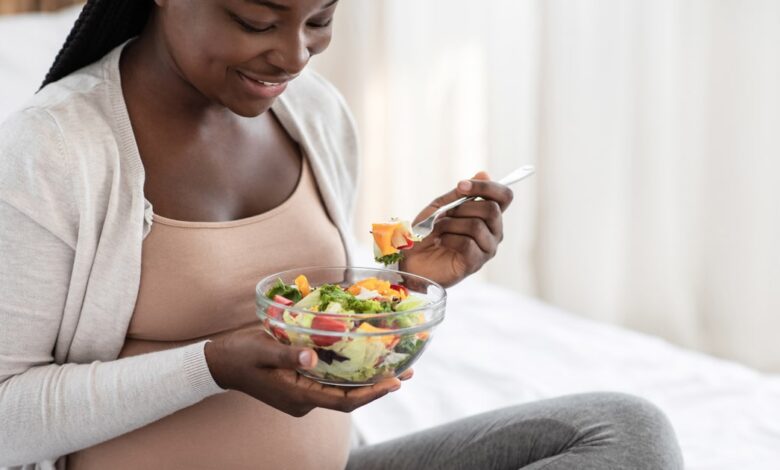Following a Mediterranean diet during pregnancy has lots of benefits, study finds

Women who follow a Mediterranean diet during pregnancy may lower their risk of developing dangerously high blood pressure and other bad outcomes, a new study suggests.
An analysis of food consumption and outcomes data from nearly 8,000 pregnant women revealed that those who stuck most closely to the Mediterranean diet were less likely to develop preeclampsia (high blood pressure during pregnancy), eclampsia (a complication of preeclampsia that causes seizures and coma) and gestational diabetes (diabetes in pregnancy when it didn’t exist before). Children born to the women who followed the diet were also less likely to be stillborn, born preterm and small for gestational age, according to the report published in JAMA Network Open.
Is the Mediterranean diet good for pregnancy?
“We found that women who reported eating foods consistent with the Mediterranean diet around the time of conception and pregnancy had a lower risk of adverse outcomes and, in particular, preeclampsia and diabetes,” study co-author Dr. Natalie Bello, associate professor of cardiology and director of hypertension research at the Smidt Heart Institute at Cedars-Sinai Medical Center in Los Angeles, tells TODAY.com. “We found that women of all races and ethnicities benefited equally, and among those who were 35 and older, there was even stronger benefit from this diet.”
Bello was especially pleased with the preeclampsia finding because the condition can be one of the more dangerous pregnancy outcomes. The kidneys, liver and blood clotting can also be involved, she says.
“The reason we worry is it’s associated with a risk for both mom and baby, and if the blood pressure isn’t treated, it can become eclampsia, and the woman can experience seizures,” Bello says, adding that the condition can sometimes prompt doctors to deliver the baby early.
The new study is “really exciting,” Judy Simon, a registered dietitian nutritionist specializing in reproductive health at the University of Washington in Seattle, tells TODAY.com. “It’s giving us some great evidence on the impact of what a woman is eating at the time of preconception and how this can have a positive impact on the pregnancy and preventing adverse outcomes.”
“What’s most interesting is that they had large enough numbers that they could look at age, race and ethnicity,” Simon says. “It provides a positive message for both providers and women trying to conceive or are pregnant.”
Research has shown that most women are not eating enough fruits and vegetables, Simon says. “Just the addition of healthy foods is going to have a very positive benefit for both mom and baby,” she adds.
And those benefits can carry over to life after the baby is born,
“There’s a 50% chance of developing diabetes later in life if a woman has had gestational diabetes,” Simon says.
Another interesting feature of the study “is that the impact of a healthy diet was shown across all races and backgrounds, and it didn’t matter if the woman was obese or not,” says Marc C. O’Meara, registered dietitian and senior nutritionist at Brigham and Women’s Hospital in Boston.
What the research on pregnancy and the Mediterranean diet shows
To take a closer look at the impact of the Mediterranean diet on adverse pregnancy outcomes, Bella and her colleagues turned to data from the Nulliparous Pregnancy Outcomes Study, which enrolled 10,038 women who were pregnant for the first time and were in their first trimester. The ethnically and racially diverse group of women recruited from eight university health systems were followed through the rest of their pregnancies.
At the beginning of the study, the women were asked to fill out a food frequency questionnaire. Their responses were categorized into the nine components of the Mediterranean diet: vegetables, fruits, nuts, whole grains, legumes, fish, the monosaturated fat-to-saturated fat ratio, red and processed meats and alcohol. The researchers calculated a score that reflected how closely each woman’s food consumption resembled a Mediterranean diet.
In their analysis, Bello and her colleagues included only information from the 7,798 women for whom there was complete data. The researchers found that women who more closely followed a Mediterranean diet were 21% less likely to have any pregnancy-related adverse outcome, 28% less likely to develop preeclampsia and 37% less likely to develop gestational diabetes.
Previous studies have also found that the Mediterranean diet improves pregnancy outcomes. A study published in the Journal of the American Heart Association in April had similar findings regarding preeclampsia. Another one published in PLOS Medicine in 2019 found reduced risk of gestation diabetes.
Is the Mediterranean diet good for fertility?
Both Bello and Simon remark that the research shows that following the Mediterranean diet during preconception can boost pregnancy outcomes.
Another recent study published in the journal Nutrients found that the Mediterranean diet can also improve sperm quality. How? By reducing inflammation in the body, the Australian researched noted. Some of the components of the Mediterranean diet that were especially effective at reducing infertility were: monounsaturated fats, flavonoids, vitamins C and E, polyphenols and limited intake of processed meat.
Diets that are low in fruits and vegetables and high in sodium and fat have been associated with higher inflammation.
Starting the Mediterranean diet in pregnancy
“Women who want to change their diets should take one step at a time and try to work up to at least two to three servings of fruits and vegetables a day,” Simon advises.
Bello offers similar guidance:“I tell women who want to switch to a healthier diet to start small and not to completely revamp their diets. Start by adding an extra vegetable and swapping out one meat meal. Try to choose whole grains and avoid ultra-processed foods.”
O’Meara says he usually starts by giving women “practical ideas on how they could move towards this type of eating pattern” based on what they’re eating already when he first meets with them.
“I introduce the balanced plate concept in which vegetables are the largest part of the plate, size wise,” he explains. “Protein and carbohydrates combined go on the other side of the plate.”
It’s important to make sure that the space taken up by the protein is as large as that taken up by the carbohydrates, O’Meara says. “Protein controls the rate at which carbohydrates enter the blood. If the carbohydrate is bigger, blood sugars go up. Another big piece of this is healthy fats, like olive oil, avocado and fatty fish.”
What is the best diet for pregnancy?
During pregnancy, it’s important to eat a variety of vegetables, fruits, whole grains, fat-free or low-fat dairy products and protein, according the U.S. Department of Health and Human Services.
Try to avoid added sugars, saturated fats, sodium, and refined grains and starches. You should also try to eat the correct number of calories a day, which for most women means none extra in the first trimester, 340 extra in the second and 450 in the third. Your doctor of midwife will be able to help with this calculation.
Part of a good pregnancy diet also means taking a prenatal vitamin with folic acid, iron and iodine every day.
The HHS also recommends eating 8 to 12 ounces of seafood each week as part of a healthy pregnancy diet. Opt for foods that are lower in mercury, such as: canned light tuna, catfish, cod, herring, oysters, salmon, shad, shrimp, tilapia and trout. Avoid bigeye tuna, king mackerel, marlin, orange roughy, shark, swordfish or tilefish due to their mercury content.
Get Best News and Web Services here







